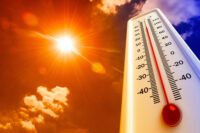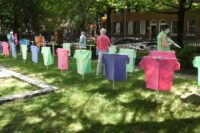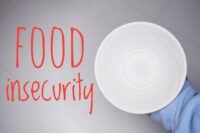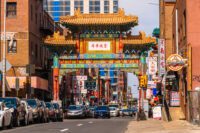SOCIAL JUSTICE CALENDAR
How can you join in St. Peter’s Social Justice efforts? Follow our Social Justice Calendar! Each month we highlight specific issues and offer a variety of ways to learn and do more. This calendar is not exhaustive. If there is a monthly observance or specific event you’d like us to include, please email Rev. Sarah [email protected].
This Month's Social Justice Focus:
Heat-Related Disparities
Now that we are in the hottest season of the year, the Social Justice Discernment Group thought it important to focus on heat related illnesses, ways to stay safe, and disparities in exposure to heat stress.
The latter is especially prevalent in urban settings because of what is known as the urban heat island, wherein cities are much warmer than outlying areas because of the greater amount of radiation that buildings and pavement absorb and re-emit. The urban heat island effect has been found to be much greater in low-income and minority neighborhoods, due in part to historic factors like the residential segregation brought about by red-lining and a lack of investment in vegetative cover. The problem is exacerbated by the inability of those with low incomes to afford higher energy bills from cooling their homes, which also tend to be less energy-efficient.
The City of Philadelphia has compiled extensive resources aimed at providing information on such topics as how to avoid heat stress, signs of heat stress, and where to find cooling places. The last link addresses who is at risk and provides a link to The Philadelphia Heat Vulnerability Index that shows which areas in the city are hottest and coolest during the summer, among other things.
As a preview, some of the hottest neighborhoods in Philadelphia are:
- Cobbs Creek
- Point Breeze
- Strawberry Mansion
- Hunting Park
Resources:
- Landing page, extreme heat guide: https://www.phila.gov/guides/extreme-heat-guide/
- Resources page: https://www.phila.gov/guides/extreme-heat-guide/resources/
- Fact sheets for populations more at-risk: https://www.phila.gov/media/20230519155828/heat-fact-sheet-2022.pdf
- Utility assistance, in different languages: https://www.phila.gov/documents/utility-assistance-resources-flyer/
- Heat health brochure: https://www.phila.gov/documents/heat-health-brochure/
- Extreme heat guide, who’s at risk – great for recognizing higher risk and disparities: https://www.phila.gov/guides/extreme-heat-guide/whos-at-risk/
In a heat health emergency, you can call the Heatline at (215) 765-9040 for advice on staying cool and information on emergency services. For medical emergencies, call 911 immediately.
If you haven’t already, sign up for Ready Philadelphia to get text and email notifications about heat and other emergencies: https://www.phila.gov/programs/ready-philadelphia/
Past Social Justice Topics:

Heat-Related Disparities
Now that we are in the hottest season of the year, the Social Justice Discernment Group thought it important to focus on heat related illnesses, ways to stay safe, and disparities in exposure to heat stress. The latter is especially prevalent in urban settings because of what is known as the urban heat island, wherein

Gun Violence Awareness
Gun violence is a crisis across our country. St. Peter’s is committed to addressing gun violence through education, activism, and helping members access information about effective common sense gun reform possibilities. For this month, here are some simple ways to get involved: Wear Orange Weekend – June 3-4 St. Peter’s will join millions of people

Food Insecurity
This month, the St. Peter’s Social Justice Discernment Group has elected to lift up the challenges felt by 30% or more of Philadelphians struggling to feed themselves and their families. In March, SNAP benefits were cut, removing the emergency boost many families had been receiving since the start of the COVID-19 pandemic. This means that

Chinatown Arena
This month, the St. Peter’s Social Justice Discernment Group has chosen to address the specific issue of the Chinatown arena within the larger context of the chronic struggle of our marginalized communities, often communities of color, to maintain their integrity and stability in the face of development. The articles and videos included here present an
